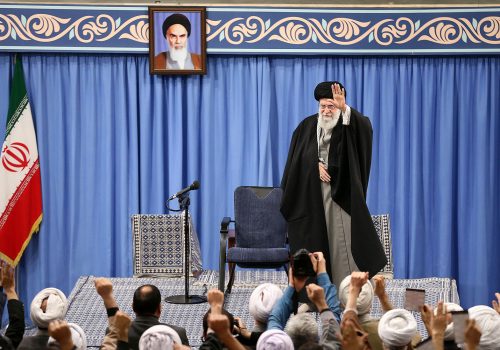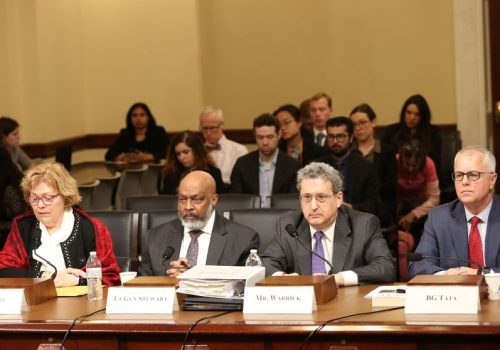Gissou Nia testifies to House Committee on Homeland Security, and subcommittee on Counterterrorism, Law Enforcement & Intelligence
Gissou Nia, Strategic Litigation Project director, testified before the House Committee on Homeland Security, and subcommittee on Counterterrorism, Law Enforcement & Intelligence. Below are her prepared remarks on addressing transnational repression threats to homeland security.
Hello Mr. Chairman, Mr. Ranking Member, members of the House Committee on Homeland Security, and subcommittee on Counterterrorism, Law Enforcement & Intelligence, thank you for inviting me to testify today on the problem of transnational repression and the threat it poses to the United States and Americans wherever they may be in the world.
I am a lawyer specialized in international criminal law and human rights law who is the founder and director of the Strategic Litigation Project at the Atlantic Council. I founded the Strategic Litigation Project in 2019 to seek redress for victims and survivors of human rights violations, atrocity crimes, terrorism, and corruption. Part of the work of our team focuses on cross-border crimes and the risk that authoritarian states pose to dissidents around the world. In assessing these threats, we work closely with activists and impacted communities to understand patterns and the nature of these threats—which can often be context and country specific. Our team includes lawyers from the Uyghur community, Venezuela, Cuba, Afghanistan, Iran, and other regions of the world. We are often consulted by governments, UN experts, private practitioners, and targets of transnational repression on what legal and policy options are available to address this growing problem. My testimony today is informed by that work, as well as my experience over the past two decades working with civil society from oppressive regimes around the world and understanding the unique threats that activists, journalists, human rights defenders, and others who speak truth to power face.
**
First, I am going to discuss gaps in the law here in the US and new legal tools that can address the problem of transnational repression. Then, I will touch on a few themes I have observed in interacting with communities impacted by this problem and how this can help better inform law enforcement.
1- Congress should pass better criminal and civil legal tools to combat transnational repression.
Fighting transnational repression should start with defining, in clear legal terms, exactly what it is.
Currently, there is legislation pending before Congress that will help define transnational repression and formulate a strong foreign policy response to this phenomenon. The Transnational Repression Policy Act, introduced by a bipartisan group of Senators and building on a provision Congress passed in the NDAA for 2022 which focused on the abuse of INTERPOL by authoritarian regimes, seeks to do this.
However we also have a need for a robust criminal legal approach to address the problem of transnational repression that can better synthesize the crime and its penalties.
A comprehensive definition introduced through legislation could allow prosecutors to target perpetrators more directly. For example, in the criminal indictment against the perpetrators who attempted to kidnap Iranian-American dissident Masih Alinejad, there was a reliance on charges such as conspiracy to commit bank and wire fraud and conspiracy to commit money laundering. While the first paragraph of that indictment identified the problem as one of transnational repression, the lack of a specific provision in the US Code meant the defendants needed to face a range of other charges.
In that indictment, the four Iran-based defendants were charged in federal court because they hired a private investigative firm based in the United States and used the US financial system, which is prohibited to agents of the Islamic Republic. But many other acts leading up to the kidnapping plot encompassed transnational repression. For example, Islamic Republic of Iran officials pressured Ms. Alinejad’s family with offers of payment to lure Ms. Alinejad to meet them in a third country, where she could be more easily abducted. They also imprisoned her brother on unfounded national-security charges, simply to exert pressure on Ms. Alinejad.
These are all acts of transnational repression intended to target a US person, but they do not fall neatly within existing US criminal law.
A survey of DOJ indictments against PRC actors engaging in transnational repression reveals a similar pattern of charging.
A new legal definition could specifically outline what types of acts will constitute harassment and persecution—including crimes like murder, torture, and kidnapping, as well as cyberattacks and the spread of disinformation.
As lawmakers consider legislative proposals to criminalize transnational repression, jurisdictional reach should also be a key consideration. Title 18 of the US Code already provides jurisdiction outside the United States over a broad range of international crimes such as torture, genocide, war crimes, recruitment of child soldiers, trafficking, piracy, and terrorism.
But jurisdiction must be expansive enough to protect victims. If a bill only allows for the exercise of extraterritorial jurisdiction when the perpetrator or victim is a US national, it would leave an accountability gap. For example, prosecutors would be hindered from bringing a case if foreign family members of a political dissident are being targeted by a foreign state and that political dissident has recently arrived in the United States as a refugee or asylum seeker.
Short of a federal criminal statute specifically addressing transnational repression, other proposals that might help enforce accountability include an extraterritorial federal criminal statute for extrajudicial killings, which could provide accountability if a US-based dissident’s family members are killed.
Then there are civil litigation tools that could provide remedies for transnational repression.
Under the “terrorism exception” to the Foreign Sovereign Immunities Act, individuals can sue US-designated state sponsors of terrorism—currently Iran, Syria, North Korea, and Cuba—for extraterritorial acts including torture, extrajudicial killing, and hostage-taking. But that is only possible if the plaintiffs were US nationals at the time the act occurred.
Congress could amend the statute to allow individuals to sue if they are US nationals or lawful permanent residents at the time the claim is brought, allowing newly arrived dissidents who are the target of transnational repression to hold the governments of their origin countries accountable.
Staying on the topic of exceptions to the FSIA, the Homeland and Cyber Threat (HACT) Act has been introduced and re-introduced before the House since 2019 and would partly address transnational repression by allowing dissidents who are US nationals to sue foreign states that launch cyberattacks against them.
However, this would not address the problem of accountability against private companies—who facilitate the sale of spyware used against dissidents. A series of judgments from the US Supreme Court have restricted the possibilities for corporate liability and this negatively impacts the ability of US-based non-citizen dissidents to sue companies involved in surveillance. These barriers to accountability in US domestic law must be removed.
2- How to address transnational repression from US allies versus from US adversaries.
Another critical aspect of this problem is to how to identify and address threats posed to US citizens and residents by US allies, not adversaries. A quick glance at the FBI website to report instances of transnational repression shows a list of DOJ indictments against individuals from China, Russia, and Iran but there is nothing to indicate that these threats can also come from Saudi Arabia, Egypt, the UAE, Rwanda, and even India.
Transnational repression is not only carried out by US adversaries, it is also carried out by authoritarian governments with strategic partnerships with the US conditioned on aid packages, arms deals, political support, and trade relationships. These authoritarian states have the same interest other authoritarian states do in silencing dissidents abroad, and their friendly relationship with the US does not deter them from targeting dissidents on US soil.
The nature of the relationship between governments does however affect how confident the victims and impacted communities feel in coming forward to law enforcement here in the US to inform authorities of the problem. In consultations I have had with dissidents from countries friendly with the US, they have expressed fear or reluctance in approaching US authorities to detail the threats they face. There is a pervasive feeling that US authorities may not defend their interests in the same way they would if the perpetrators were from an “adversary” country like Russia, China, or Iran—where US foreign policy has taken a clear position in defending the interests of Americans with no trade-offs.
The efforts that the FBI has taken to encourage impacted communities to report incidents of transnational repression is admirable, but it will only be as strong as the willingness of communities to come forward. Similarly, the Transnational Repression Policy Act instructs DHS to create a tip line for victims and witnesses of transnational repression to share information with the US government—but again, these communities need to trust that this information will be acted on in a beneficial, not harmful, way and this will require trust.
This touches on a last point. The strategy to combat transnational repression domestically will be strengthened with improved global coordination to tackle bad actors. Given the cross-border nature of this crime, the repression may begin in the origin country, but it can touch other countries along the way, in a chain of repression that ultimately can impact US interests. For example, both Saudi Arabia and Egypt have consented to China’s requests that Uyghur dissidents be repatriated to China—despite the risks that those dissidents will be imprisoned and sent to “reeducation” centers. And multiple US residents who are dissidents from authoritarian regimes have been detained or abducted while traveling through the UAE and sent to their origin country. US law enforcement should work with their counterparts in allied countries to assess why this is happening and undertake efforts to better protect dissidents.
** *
Mr. Chairman, Mr. Ranking Member, and Members of the Committee, thank you again. I look
forward to your questions.
Further reading
Wed, Jan 8, 2020
De-escalation still possible after Iran’s missile retaliation
New Atlanticist By
Iran avoided a central US red line, and "therefore, the Trump administration will have the opportunity to test Iranian claims that they truly do not seek any further escalation," Will Wechsler says.
Wed, Jan 15, 2020
Congressional hearing – “US-Iran tensions: implications for homeland security”
Congressional Relations By
The Committee meeting examined the homeland security implications of the recent escalation in US-Iran tensions in the wake of the killing of Qasem Soleimani. Witnesses were given time to present opening statements to address possible retaliation followed by questions posed by committee members. Nonresident Senior Fellow Thomas S. Warrick presented four ways in which Iran threatens the homeland: terrorism, cyber-attacks, disinformation, and influence operations. Warrick underscored the imminent threat posed by Iranian cyber-attacks, “Mr. Chairman, the possibility of a terrorist attack by Iran here in the homeland is that, a possibility, but cyber-attacks are a certainty.”
Mon, Feb 3, 2020
Can Iraq’s new prime minister nominee navigate Baghdad’s political chaos?
New Atlanticist By
The next task for Allawi is to win the consent from two mutually exclusive spheres of influence inside Iraq: the protesters who forced the resignation of the current government at a high cost with nearly a thousand lives lost and more than twenty thousand wounded and the entrenched political actors who are still unwilling to give up all or part of their extraordinary privileges and take steps to curb corruption.


